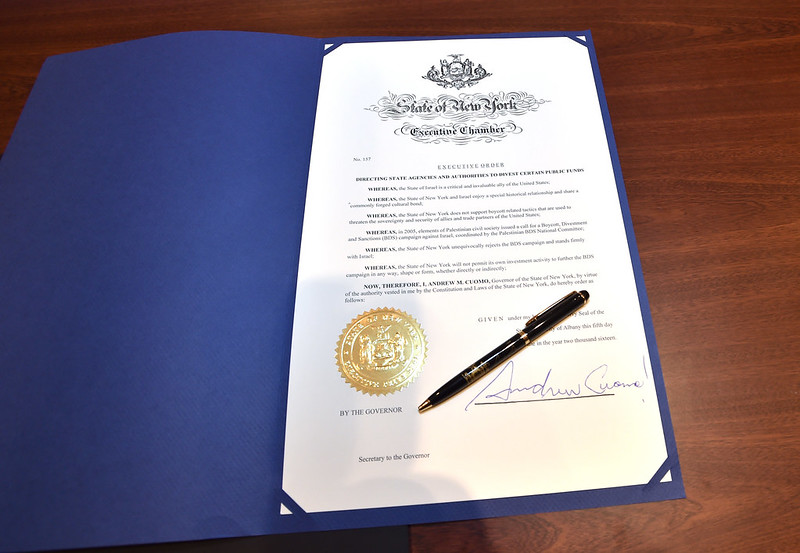
A Cuomo executive order (photo: Kevin P. Coughlin/Governor's Office)
Death is all around us and forcing New Yorkers, regardless of age, ability, or immigration status to confront our vulnerability and mortality.
Among the “acts” in a recent “This American Life” episode, writer/daughter Jiayang Fan in a “A View from the Park,” spoke of her fear and trauma at no longer being able to visit her mother in a nursing home. Fan vividly expressed her feeling of desperation because her mother has ALS and while cognitively sharp, can only communicate with her eyes, as she is a prisoner in her own body. Her mother is among the most frail and vulnerable to contracting the new coronavirus (COVID-19) and if she does, it is likely she will die. Fan, in a recent New Yorker article, also explored dying, family, and culture through the lens of hospice in China.
In another “act” in that same episode, “The Inside Game,” a producer took us inside an apartment where two parents and their young daughter were literally fighting for their lives against the coronavirus. With death staring him in the face, the father spoke of the need to get his “affairs” in order.
Even in the best of times, we need to plan for incapacity and death. With the COVID-19 pandemic bearing down on New York, such planning becomes more urgent. Key planning documents include a will, health care proxy, power of attorney, and for parents of young children, a standby guardian designation.
New York law requires that two people act as witnesses to these documents, except a power of attorney can be signed before a notary public, but an optional “statutory gifts rider” needs two witnesses. (Under the recent Executive Order EO 202.7, the power of attorney could be signed and notarized remotely.)
Yet the process of legally executing these documents would violate Governor Cuomo’s “New York on PAUSE” executive order and place the participants at risk of harm from exposure to the coronavirus.
While it is true that a will is not the only way to plan for death—for example, we can name beneficiaries on retirement accounts, bank accounts, or life insurance; we can create trusts; and we can name a person as a joint owner of bank accounts and other assets—a will is often an essential part of estate planning.
For many people, making a will can avoid family conflict, distribute property as the testator wishes, name a guardian for minor children, and express wishes about funeral and burial arrangements.
All parents of minor children should name guardians “just in case,” but parents with chronic or fatal medical conditions, or who are undocumented and vulnerable to detention or deportation, have a particularly important duty to plan for the care of their children.
Under New York law, parents who are vulnerable due to a medical condition or immigration status have the option of designating a Standby Guardian, “just in case” the parent becomes unable to care for the children due to illness, death, detention, or deportation.
A health care proxy names an agent to make health care decisions. In some ways, the health care proxy is less important, because of the NY Family Health Care Decisions Act, which allows a spouse, child, other family member, or friend to make health care decisions in a hospital, nursing home, or hospice facility.
But a health care proxy is important because it allows us to choose an agent and give individualized directions about medical treatment under certain conditions. Also, and perhaps most troublesome, health care proxies often get signed in a health care facility, and this is not a burden that health care workers should bear along with everything else.
Allowing for electronic signatures and remote witnesses for these planning documents would not sacrifice their integrity and more importantly, would prevent more New Yorkers from being exposed to or transmitting COVID-19.
Governor Cuomo should make it possible for New Yorkers to execute planning documents in this emergency by signing a new executive order that does the following three things:
One: Suspends Section 307(1) of the State Technology Law to the extent necessary to allow an electronic signature to be used instead of a signature written by hand in executing a will, health care proxy, designation of standby guardian for minor children, and the statutory gifts rider to a power of attorney.
Two: Modifies Sections 3-2.1 and 3-2.2 of the Estates, Powers, & Trusts Law, Section 2981 of the Public Health Law, Section 1726 of the Surrogate’s Court Procedure Act, and Section 5-1514 of the General Obligations Law to allow for remote witnesses for a will, health care proxy, designation of standby guardian for minor children, and the statutory gifts rider to the power of attorney.
Three: Extends to workers of “essential businesses or entities” the right to make an oral or written will under New York Estates, Powers, Trusts Law § 3-2.2, which allows oral wills without witnesses and written wills signed by the testator for those serving in, or accompanying, the armed forces, or mariners at sea.
***
Joe Rosenberg is a Professor at CUNY School of Law. On Twitter @JoeRosenbergLaw.
***
Have an op-ed idea or submission for Gotham Gazette? Email opinion@gothamgazette.com




